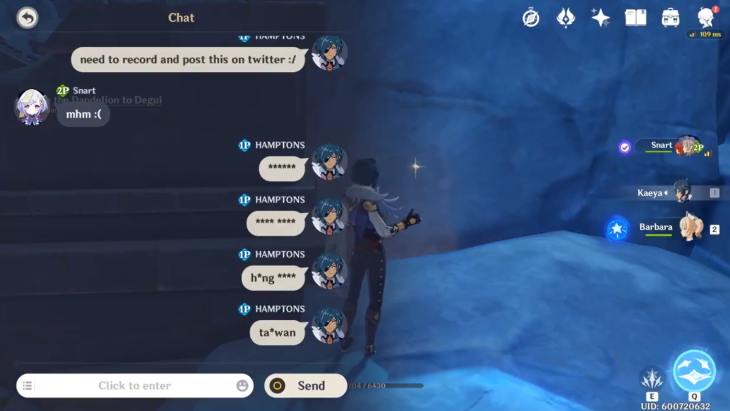
The multiplayer chat for Chinese developer miHoYo’s Genshin Impact has been discovered to censor any mention of Hong Kong or Taiwan.
The open-world action RPG is currently available and free to play on Windows PC (via their website), PlayStation 4, and both iOS (App Store), and Android (Google Play). The game is also coming soon to Nintendo Switch.
Silicon Era and RPG Site journalist and translator Kazuma Hashimoto tweeted a video of the game on Windows PC. Therein, attempts to send messages to other players with the words “Taiwan,” “Hong Kong,” and even “Hong” and “Kong” separately were all censored.
Here is a clip I just recorded. Just in case if this changes for whatever reason here is recorded proof. The entire word "Kong" has been censored in Genshin Impact. pic.twitter.com/JCWjOEUBaf
— Kazuma Hashimoto (@JusticeKazzy_) October 6, 2020
Changing one letter to an asterisk (i.e. H*ng or Ta*wan) seemed to deceive the censor. Hashimoto states on his Twitter profile that he is living in Dusseldorf, Germany- meaning this is not the Chinese version of the game (if such separate versions even exist).
For those unfamiliar, the Chinese government has a “One-China” policy. This means censorship and outright denial that Taiwan (originally known as the Republic of China) is an independent nation, and is part of the People’s Republic of China.
In short, “China” has united and divide many times over the years. While the Republic of China formed in 1912, the Chinese Civil war saw the faction retreat to the island of Taiwan in 1949.
The other faction became the People’s Republic of China, forming and controlling the mainland along with several other islands. The Republic of China lost its status as “China” in the United Nations’ UN Resolution 2758, in 1971.
China have demanded nations who wish to deal with them not deal with Taiwan, and allegations of China using its influence to restrict any mention of the “Two Chinas.” This includes allegations of China influencing sporting events such as the Olympics from prevent Taiwan from even entering under its new name. This resulted in Taiwan entering under “Chinese Taipei” in the 1980s.
This has had an affect on video games and gaming culture as well. War Thunder developer Gaijin Entertainment have removed Taiwanese flags from the game in 2019, and replaced them with the People’s Republic of China’s flag (despite the historical inaccuracy).
Hololive vtubers Kiryu Coco and Akai Haato both received three week suspensions for merely mentioning Taiwan during a livestream. Both were discussing viewing figures, and where their audiences came from.
The Hong Kong Protests have also sparked censorship from the Chinese government, even demanding overseas businesses censor any mention of them; let alone support.
The most prominent of these was in 2019, when pro-Hearthstone player Blitzchung was suspended by Blizzard Entertainment for his support of the Hong Kong protests, firing the casters, and their overall handing of the entire debacle [1, 2, 3].
As we had mentioned in a prior article, NBA Houston Rockets’ General Manager Daryl Morey showed his support for the Hong Kong protests, resulting in the Chinese government refusing to broadcast NBA games in China.
Tiffany & Co. removed and apologizing for an advert of a model with her hand over one eye, after claims it was supporting the Hong Kong protests. At least one protester had been blinded in one eye after being shot by police.
This placed a greater focus on companies attempting to appeal to the Chinese government, in order to sell their products or services in China. South Park‘s “Band in China” episode also mocked entertainment companies such as Disney attempting to appeal to Chinese government censors.
There is also an extensive list of actions companies have taken to avoid upsetting the Chinese government in the last few years. Including the denial of Tibet and Taiwan as independent nations (even referring to Taiwan as its own country by accident), mentions of the Tienanmen Square Massacre, giving cloud and smartphone encryption keys to Chinese authorities, removal of intentionally pro Hong Kong comments and works, and firing employees for supporting the Hong Kong protests.
Niko Partners Senior Analyst Daniel Ahmad explained in a Twitter thread that miHoYo are based in mainland China, and as such are bound to comply to the law stating games cannot contain “anything that threatens China’s national unity.”
Ahmad shared an extract from Niko Partners’ report on the China Regulations and Approval Process, highlighting that “Anything that threatens China’s national unity, sovereignty, or territorial integrity” is banned.
“This includes but is not limited to content that interferes with or attacks the sovereignty of China, such as its claim to Taiwan or the South China Sea. Claiming that Taiwan is a sovereign state is prohibited and the country must be listed as ‘Chinese Taipei’. Maps that do not reflected disputed territories as China’s are also banned, as is content that takes place in real Chinese locations and distorts reality or history. We note that certain games have been banned for including Taiwan and the Taiwan flag in the game as a sovereign nation. Other games have had to rename real world locations in China to avoid censors banning the game for historical inaccuracies.”
Ahmad notes that while this law does not apply to those outside of China (and as such developers can make “Chinese-approved” versions of games separate from games for other regions), “it’s not always that simple for Chinese devs specifically.”
This is not the first time the game’s Chinese origins have sparked distrust. In late September miHoYo updated the game’s anti-cheat software to not continuously run even when the game had closed or was uninstalled.
The developer stated they “realized that the default activation of this mechanism may have caused some privacy concerns for players.” However, miHoYo emphasized the anti-cheat software “does not process, save, or upload information in any way whatsoever.”